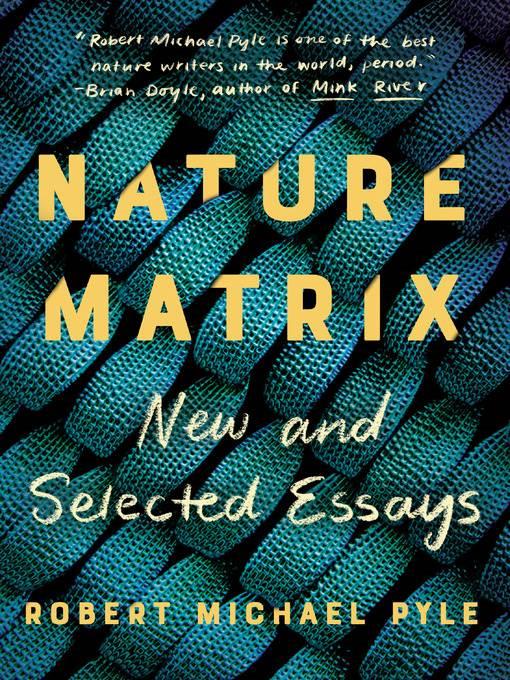
Nature Matrix
New and Selected Essays
کتاب های مرتبط
- اطلاعات
- نقد و بررسی
- دیدگاه کاربران
نقد و بررسی

June 1, 2020
In this thoughtful collection, biologist Pyle (Tidewater Reach) examines the natural world and humanity’s place in it. Each essay reads as a standalone piece, though the ideas within benefit from closeness to one another. In an early essay, for instance, Pyle posits that while physical books offer a “direct experience,” digital ones do not. Later, Pyle elaborates on the value of experience, opining that the loss of a species isn’t just regrettable for the animals’ sake, but also because it represents humanity’s experience of the species disappearing. Pyle’s arguments are strongest when they deal in nature, and when his passion emerges in intricate details about landscapes, animals, and theories of the wilderness. “To what extent can the wild and the Wilderness include our own species; and how?” he wonders at one point. Occasional instances of datedness in Pyle’s word choices and attitudes may distract otherwise sympathetic younger readers—his description of visiting his “coed sister” in college, for example, or his resistance to the connected digital life. But these infrequent moments do not detract overly from Pyle’s message. His probing, thoughtful assemblage will resonate with readers who agree that nature needs to occupy a larger role in modern life. Agent: Laura Blake Peterson, Curtis Brown Ltd.

June 15, 2020
Biologist and versatile nature writer Pyle collects rangy essays on the natural world. In his latest book, the author, founder of the Xerces Society, examines how "a strong individual sense of connection to nature and natural processes is utterly essential to the healthy coexistence of humans with their biological neighbors and physical setting." The author takes his time while considering habitats and ecologies--or sussing out the semiotics of Bigfoot ("the observed facts suggest that we would be foolish to dismiss the actual occurrence of unnamed hominoid apes...as fantasy, hoax, or solely a metaphor")--but what Pyle truly desires is to encourage readers to get outside, take in the details of nature, and avoid at all costs what he calls the "Extinction of Experience." As he sagely notes, "the sequelae to extinction and alienation are further loss and greater detachment, round and round...a cycle of disaffection, degradation, and the ultimate separation of nature." Throughout these essays, the author brings an intimate, protective feeling for the natural world, whether expressed as old-school sublimity ("ephemeral pools of unthinkable clarity") or a more modern appreciation of urban raw land, waste ground, and vacant lots, all of which possess qualities of possibility, imagination, escape, and discovery. Occasionally, Pyle allows a lecturing tone to creep in--"Most mountain walkers never see these common things"; "these people would be better off spending their pennies on a Roger Tory Peterson field guide"--but mostly what comes across is the author's unbridled enthusiasm as a witness to the world's many wonders, from wildness (a sliding scale "in the sense of that which takes us out of ourselves") to the clump of moss in the sidewalk crack, what Nabokov would call "individuating detail." Pyle proves yet again that he is one of the most nourishing nature writers at work today. If Pyle doesn't arouse your biophilia, check your pulse.
COPYRIGHT(2020) Kirkus Reviews, ALL RIGHTS RESERVED.

























دیدگاه کاربران